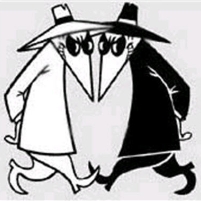Was an Intelligence Officer Fired for Friendship with Communists…or Because of a Typo?
Wednesday, January 13, 2010

Two missing letters from an intelligence document cost John Dullahan his spy job with the Department of Defense, he claims in a lawsuit filed against much of the intelligence community. Dullahan, who spent two decades serving as an Army intelligence officer before joining the Defense Intelligence Agency (DIA) as a civilian employee, was fired in 2009 after being accused by his superiors of fraternizing with Communist spies.
As early as 1990, Dullahan was allegedly “consorting with known Communist agents,” according to the FBI, while he was serving as an adviser to then-Chairman of the Joint Chiefs of Staff General Colin Powell. But nothing came of the accusation until late 2008, when officials in Washington subjected Dullahan to three polygraph tests. During one of the lie detector exams, an FBI examiner told him that his “participation in Ranger, Airborne training, and combat duty (as well as his enjoyment of hang-gliding) demonstrated risk-taking behavior which made him more likely to seek contact with a foreign intelligence service.”
Then, the FBI asked him about “an unspecified foreign intelligence service ‘offer’” that he mentioned in one of his letters. Dullahan claims he had misspelled “officer,” and had meant to write: “I went to the home of the Soviet officer”—something that was permitted as part of his work.
After being put on administrative leave in early 2009, Dullahan was given the option of resigning with a full pension, but declined because he wanted to clear his name. He was then terminated.
Dullahan is suing the DIA, the FBI, the Pentagon and the Office and Director of National Intelligence and is seeking $201,000 in damages and a declaration that would clear his name.
-Noel Brinkerhoff
Intelligence Officer Claims He's No Commie (by Ryan Abbott, Courthouse News Service)
John Dullahan v. Defense Intelligence Agency, et al. (U.S. District Court for the District of Columbia) (pdf)
- Top Stories
- Unusual News
- Where is the Money Going?
- Controversies
- U.S. and the World
- Appointments and Resignations
- Latest News
- What If China Invaded the United States?
- Donald Trump Has a Mental Health Problem and It Has a Name
- Trump Goes on Renaming Frenzy
- Trump Deports JD Vance and His Wife
- Trump Offers to Return Alaska to Russia






Comments